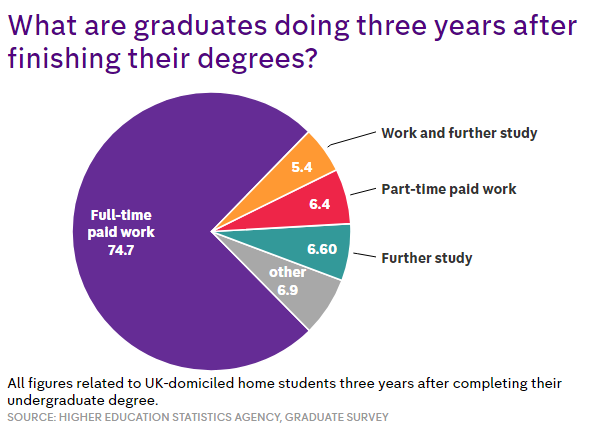It’s that time of year again. Over half a million students are preparing to start university in September (once Thursday’s A-level results are out of the way).
For many, graduation will seem a long way off. But before long, they’ll be contemplating life after university – perhaps starting a career, or continuing with their studies.
What will that post-graduation landscape look like? FactCheck investigates.
Before we start…
This article uses data from the Higher Education Statistics Agency (HESA), which conducts a survey of graduates every two years, contacting people three and a half years after they finished their studies.
That means the most recent survey, conducted at the end of 2016, collects information from the graduating class of 2012/13; the previous survey in 2014 captured data from the class of 2010/11, and so on.
And in case you’re wondering, all the figures in this article relate to people who completed undergraduate degrees as UK-domiciled “home” students. In other words, they don’t include data on students from overseas (either EU or non-EU).
Okay, housekeeping out of the way – let’s take a look at the numbers.
1. Good news: graduates are more likely to be in work than the average working-age Brit.
The 2016/17 HESA survey shows that 81 per cent of people who finished their undergraduate degree three years ago are in full- or part-time work. That’s compared to data from the Office for National Statistics, which shows that 74.5 per cent of the total working-age population are in work.
The proportion of graduates in work after three years has been higher than general employment levels for at least the last decade.

2. Men are more likely to be in full-time work three years after graduating than women
The HESA survey found that 77.7 per cent of the men who graduated in 2013 were in full-time employment by 2016. The figure for women was five points lower, at 72.5 per cent.

It looks like much of this difference is accounted for by a proportionately larger number of women in part-time work: 8 per cent compared to 4 per cent for men.
NB: part time figures don’t include people studying and working part time, which are recorded separately.
3. White graduates are 10 per cent more likely to be in full-time work after three years than black graduates
The HESA survey shows that just under 76 per cent of white graduates are in full-time paid work three years after they graduate, compared to just under 66 per cent of black graduates. 73 per cent of this Asian graduates are in full-time employment.

Black graduates are slightly more likely to be in part-time work after three years than white and Asian students (7.9 per cent compared to 6.3 per cent and 5.9 per cent respectively). Again, this part-time figure doesn’t include people who are also studying.
4. Black graduates are more likely to be in postgraduate education three years after their first degree than white or Asian students
In 2016, just over 14 per cent of black graduates who finished their undergraduate degrees in 2013 were continuing their studies. Around half of those were working part-time during their courses.

Proportionately, slightly fewer Asian graduates (12.6 per cent) were still studying after three years. White graduates were the least likely to be on postgraduate or other courses – 11.7 per cent.
5. The proportion of graduates in full-time work is rising, but still hasn’t reached its pre-crash peak.
In 2008, just under 76 per cent of UK students that had graduated three years earlier were in full-time work. The equivalent figure for the 2012 survey was 71 per cent. This has been creeping up since then, but has yet to return to pre-crisis levels.

6. The proportion of graduates in part-time work rose during the financial crisis, but has declined in recent years.
A decade ago, 4.8 per cent of people who had finished their undergraduate degrees three years earlier were in part-time work. By the way, that doesn’t include people who were working part-time during further studies.
During the financial crisis, the proportion of graduates in part-time work rose to a peak of 7.4 per cent in 2012. It’s fallen since then, and now stands at 6.4 per cent.

7. 12 per cent of people are still in education three years after finishing their undergraduate degrees.
The latest HESA survey shows that 5.4 per cent of all UK graduates who finished their undergraduate degrees in 2013 are continuing their studies while working part-time. A further 6.6 per cent of that graduating class are still in education, but are not in work.




